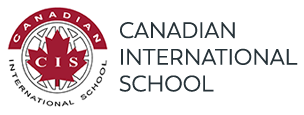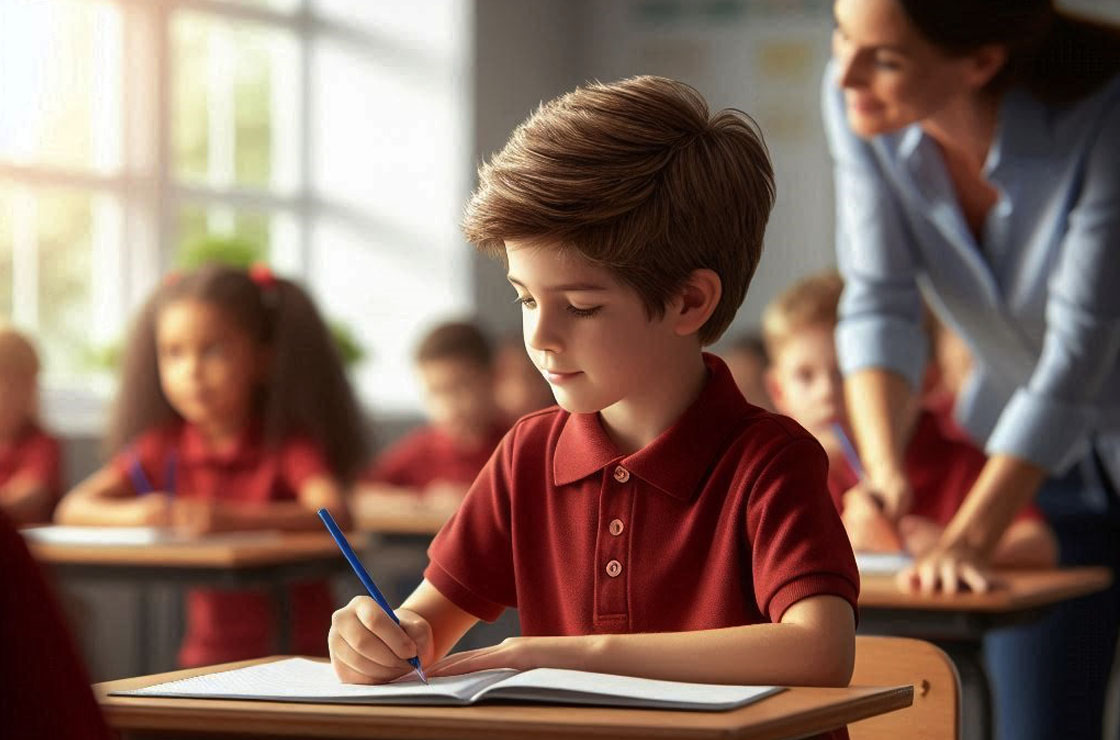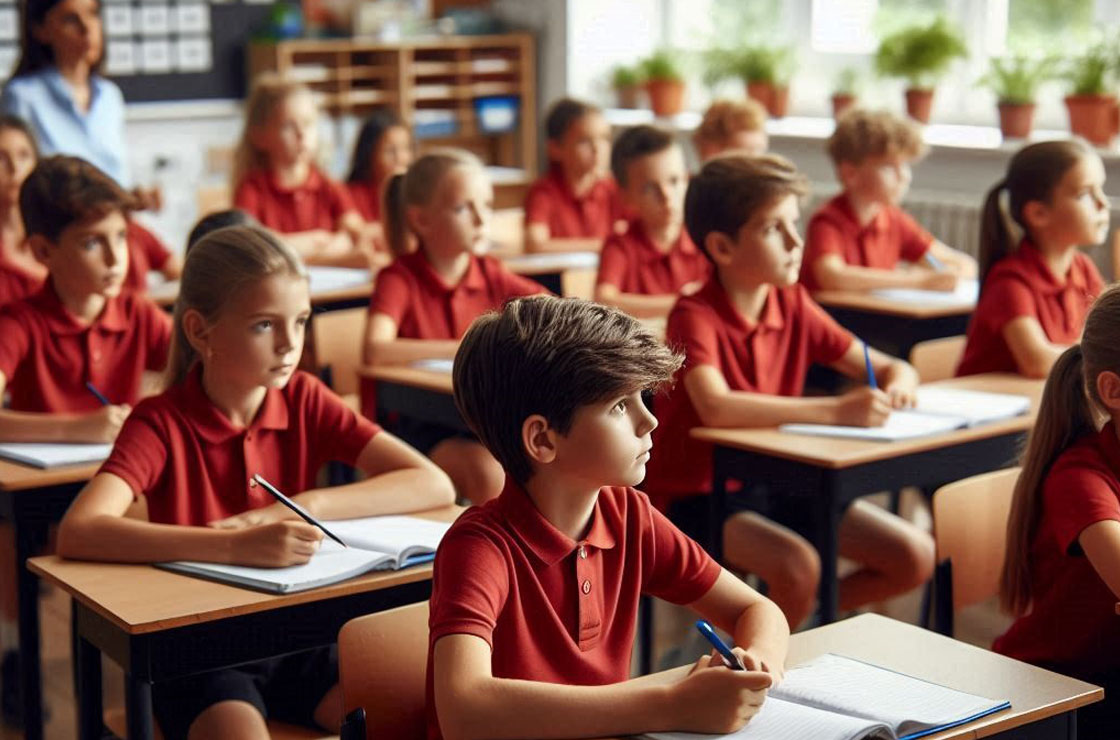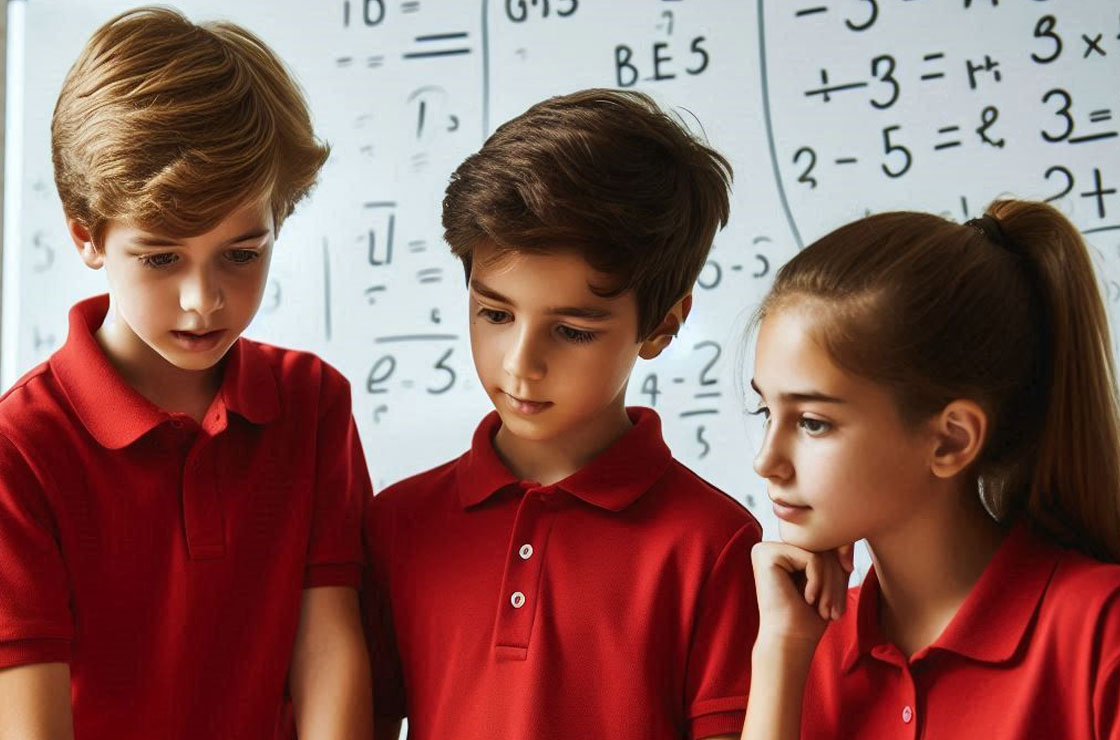+971 2 556 4206
Office Hours
Mon – Thu: 07:30 AM – 04:00 PM
Fri: 07:30 AM – 12:30 PM
+971 2 556 4206






















CURRICULUM
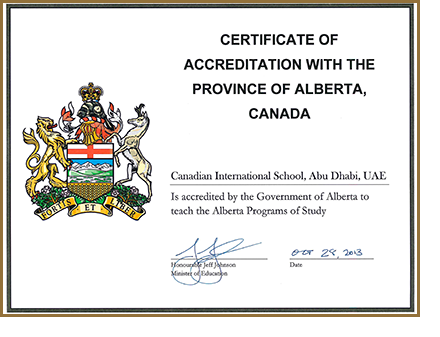
CIS’ curriculum follows the Alberta Program of Studies. Alberta’s Kindergarten to Grade 12 curriculum is designed to help students achieve their individual potential and create a positive future. The provincial programs of study identify what students are expected to learn and do in all subjects and grades.
For more information on our curriculum, please visit the Alberta Education website using the following link here.
https://www.alberta.ca/education.aspx
CIS grants Alberta high school diplomas to students based on a credit system. To complete senior high, students must be awarded 100 credits. Students are awarded credits for each course they complete with satisfactory results. In addition, Grade 12 students must write and pass diploma examinations in core subject areas to graduate. Diploma examinations are provincially administered and account for 50 percent of the students’ final grade in the course.
Alberta’s High School diploma is recognized across North America and throughout the world. High school graduates have the opportunity to continue their education at Alberta’s fine post secondary institutions or to attend some of the most prestigious universities and colleges in the world.
Alberta Program Subjects : English Language Arts, Mathematics, Science, English Social Studies, Physical Education, Art and Music, Health, Drama, Information and Communication Technology (ICT) and French.
UAE Requirements : Arabic, Islamic Studies and Arabic Social Studies are taught in accordance to the UAE Ministry of Education specifications.
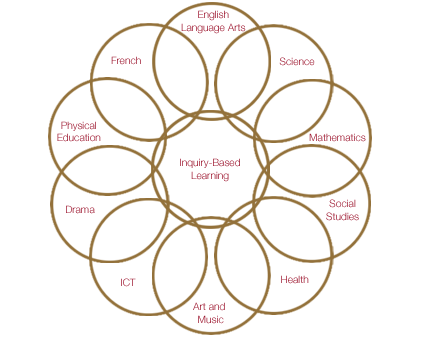

RATED OUTSTANDING
by ADEK
TIER-4 ALBERTA ACCREDITED INTERNATIONAL SCHOOL
In this page :
ALBERTA EDUCATION

Canada is a vast country of ten provinces and three territories, each of which governs its own elementary, secondary and post-secondary education programs. Although students can transfer easily throughout the provinces, there is no national or federal Education Ministry; rather, each provincial government’s educational system reflects the diversity of its region while exposing the similarities with the rest of Canada and the world.
In the province of Alberta, all Alberta Education accredited schools follow a common and rigorous curriculum for grades 1 to 12.
The strength of the Alberta Program is due in part to the continuous evaluation and controlled parameters of its rich curriculum, which specifies learner outcomes for each subject area. Students in grades 3, 6, and 9 take provincial achievement tests to evaluate grade-level standards and expectations, and Grade 12 students write provincial examinations in core subject areas to qualify for an Alberta High School Diploma. This internationally recognized diploma permits students’ entry into university programs throughout North America and the world.
Academically, Canada consistently ranks high in the international student achievement tests in Reading, Math and Science, and Alberta students rank significantly above the Canadian average.
But standardized testing does not tell the whole story. Increasingly, schools are implementing strategies to increase students’ critical thinking and problem solving skills to prepare them for life after high school.
Student-centered learning is an international educational initiative developing in response to our 21st Century global demands for highly skilled and self-directed thinkers. Training students to be problem solvers means providing them with situations that incorporate cross-curricular competencies; which is why Alberta Education promotes Inquiry-Based Learning (IBL), a “process where students are involved in their learning, formulate questions, investigate widely and then build new understandings, meanings and knowledge” (Focus on Inquiry, 2004, p.1).
IBL is not a textbook or curriculum: IBL is an educational approach that involves administrators, teachers, students and parents in a culture of inquiry – a component of all Alberta Education curricula.
For more information regarding the Alberta Curriculum, please visit the Alberta Parent Resource Website, My Child’s Learning. For specific information outlining Alberta Diploma requirements, or other educational guidelines set out by Alberta Education, see the Alberta Guide to Education.
INQUIRY-BASED LEARNING
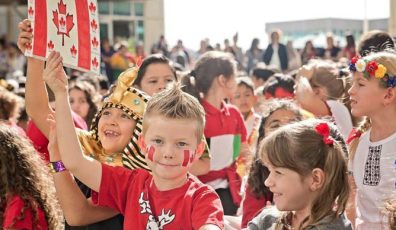
Also known as Problem-based learning or Project-based learning or PBL, Inquiry-Based Learning is an approach that has proven to increase students’ abilities to problem-solve using a student-centered delivery of instruction.
While nothing can replace the time needed for systematic math and language skill acquisition, learning opportunities to apply these skills are critical for developing problem solving skills. In IBL, a “problem” or question is presented and students must use their prior knowledge and skills to build direct and meaningful correlations to solve the problem. Math, English, Social Studies, Science, Information and Communication Technology, Fine Arts are explored in combination or simultaneously in real life contexts. Through questions and questioning, teachers and students match project objectives with the Alberta Education’s Specific Learner Expectations.
Projects bring a whole new enthusiasm to the classroom.
The scope and breadth of projects can vary from days to weeks to months. Because students are engaged in projects that are “real” to them – about the real world, their world – their level of concentration and application increase, as do their learning results.
Students learn best when they are actively engaged in activities that are important and meaningful to them. Accomplishing a task independently constitutes learning. Brain research indicates that emotion is the gatekeeper to learning, intellectual functioning is greatly impacted by experience, and personal meaning is the key to memory. (Alberta Initiative for Student Improvement, 2004, p11)
Authentic Assessment, or Performance Assessment, refers to evaluating students throughout the whole learning process and not just at the end of a unit or semester. Students and teachers benefit from these frequent assessment opportunities because strengths and weaknesses are identified prior to the “final exam.” Teachers use standards-based assessment rubrics to evaluate the students learning process at the initial planning stage, the application stage, and the final end-product stage.
As they say in PBL, “The Question is the Answer” because questions and questioning are the forerunners of understanding.
Engaging students in the learning process has astonishing consequences: attendance and academic achievement increase, and students’ overall positive interest in school and learning skyrocket.
EARLY CHILDHOOD EDUCATION
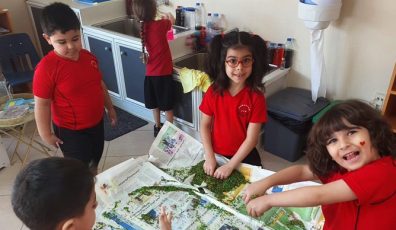
Early Childhood Education (ECE) – Playing is their job
“Children at play are highly motivated and capable of intense concentration”. Alberta Kindergarten Statement, 2005.
Research overwhelmingly supports “Purposeful Play” as a means of developing children’s love for life long learning. Given the opportunity to explore their environment through purposeful play, children acquire important life skills that meet their social, physical, intellectual, cultural, creative and emotional needs. Kindergarten is a transitional period as children move from the home to the “outside world.” CIS is committed to providing a caring, nurturing environment that assists children in developing the confidence and skills necessary to become independent learners.
CIS’ ECE facilities are designed to actively engage children in activities that explore science, language, mathematics, art, drama, music, and physical activity in a purposeful and playful way.
Indoor and outdoor play areas allow for a balance of quiet and loud play spaces; for games, sand, water, and pretend fun. CIS also features a large indoor air-conditioned hall for purposeful play.
Classroom design incorporates day lightening and warm colours for a positive learning atmosphere. And to encourage the love of reading, an extensive KG library provides children with a comfortable setting to explore stories, books, puppets, and their own imaginary world.
ELEMENTARY CURRICULUM
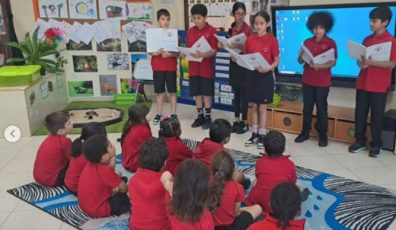
At CIS, the Alberta Education Elementary curriculum is taught by class teachers through Inquiry-Based Learning. An emphasis is made on teaching students the process of learning so that they gain not only knowledge but also an understanding of the process as well as their own individual learning style.
Class teachers cover the core subject areas of English, Math, Science, and Social Studies. In addition to increasing students’ self-confidence and rapport with their teacher, one of the major benefits of having a class teacher is to facilitate the IBL approach. By spending more time with one group of students, the class teacher knows their strengths and weaknesses and can build on their knowledge base more easily as they incorporate cross-curricular objectives.
The CIS Elementary Program also recognizes the correlation between positive self-esteem, academic success, and physical fitness. Physical Education includes promoting daily physical activity as well as teaching basic knowledge of nutrition and healthy lifestyles.
If you want to know more about Alberta Education Elementary Curriculum please click the buttons below:
SECONDARY CURRICULUM
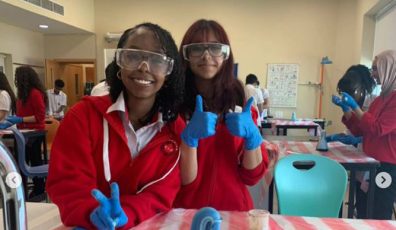
The curriculum Handbook provides parents with important information on the following:
• Selected learning outcomes for each subject area from the provincial curriculum
• Links to the Alberta Education website where more information can be found
• A questionnaire
Grades 5-8 (Middle School):
Grades 9-12 (Secondary School):
ADVANCED PLACEMENT
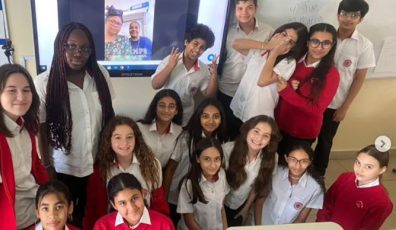
CIS is proud to offer Advanced Placement Courses to passionate students seeking a level of challenge in areas of academic interest. Advanced Placement courses are offered as enrichment and extension of the Alberta curriculum at grades 10, 11 and 12. Achievement is assessed through AP Exams in May of each school year and may result in course exemption or credit at the university level.
In the 2023-24 school year, CIS is proud to offer AP Drawing, AP Calculus AB, AP Biology, AP Chemistry, AP French, AP Microeconomics, and two new course offerings of AP World History and AP Statistics.
More information about Advanced Placement is available at https://ap.collegeboard.org/
FINE ARTS
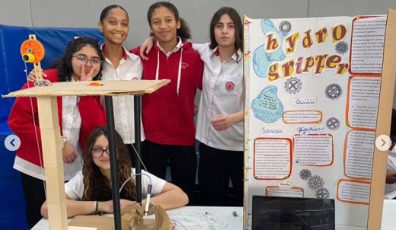
KG1 – GRADE 1 : Creating a Reggio-Style Classroom
Learners develop different art techniques such as collage, painting, tessellation, 3D modelling and pencil drawing within a Reggio Emilia style classroom environment, underpinning their knowledge and exploring different outcomes.
GRADE 2
Collage Creatures – Collages demonstrating that complex shapes can be created by combining a series of simple shapes.
Desert Landscapes – Painted drawings using warm colours and depicting the warm desert landscape.
GRADE 3
Drawing With Scissors – Abstract collages inspired by the work of Marc Chagall.
Ink Creatures – Accidental drawings built from spilled ink.
GRADE 4
Profile Companions – Profile portraiture depicting a relationship between two figures.
Faces – Charcoal portraits exploring value range and proportional drawing.
GRADE 5
Dalinian Animals – Surrealistic Dali inspired animals in watercolour.
GRADE 6
Islamic Arabesque Design – Complex Islamic Arabesque pattern on tooling foil.
Grade 7
Stop Motion Animation – 60 second Stop Motion Animation.
Grade 8
Musical Paper Sculpture – Paper sculptures based off a musical composition.
Grade 9
Plaster Relief Sculpture – Acrylic and Gypsum Plaster relief sculptures.
Grade 10
Interior or Exterior 2 Point Perspective – An interior or exterior space is created using 2-point perspective digitally or on paper.
Grade 11
Reduction Self Portrait – Self-portrait created using the reduction process (eraser on charcoal).
Grade 12
Multiples Sculpture – Sculpture with a message made from multiples of one object.
PHYSICAL EDUCATION & SWIMMING
KG to Grade 6 students at CIS are taught within 8 Realms of Physical Literacy
Alternate Environment : Students participate in a variety of land or water based activities in alternate environments. Our wonderful pool allows students to swim within our school property. Other activities may include but aren’t limited to: bowling, running off-campus, kayaking etc. These activities are also dependent upon weather conditions and resources available within the community.
Active Living – Developing physical literacy through movement and active living supports well-being across a lifespan.
Movement Skill Development – Developing physical literacy through movement and active living supports well-being across a lifespan.
Character Development – Exploration of life opportunities and virtues develops resilience and personal talents and promotes lifelong learning.
Safety – A lifetime of optimal well-being is supported by prioritizing health and safety.
Healthy Eating – A lifetime of optimal well-being and physical wellness is supported by prioritizing nutrition and healthy eating.
Healthy Relationships – Personal well-being is supported through positive relationships built on communication, empathy, and respect.
Growth and Development – Decision making that optimizes personal health and well-being is informed by understanding growth and development.
Financial Literacy – Informed financial decision making contributes to the well-being of individuals, groups, and communities.
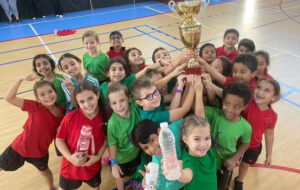
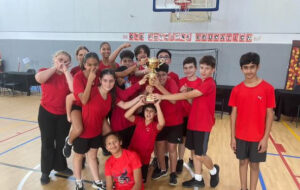
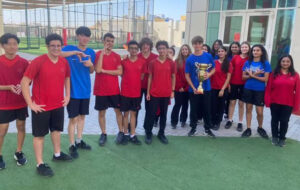
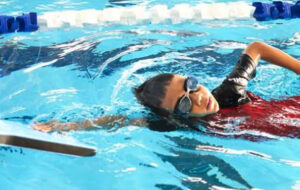
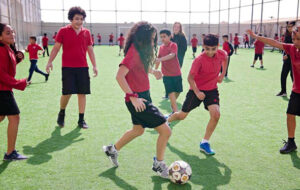
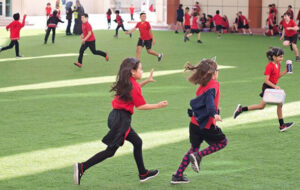
Grade 7 to Grade 12 students at CIS are taught within 5 realms of Physical Education
Alternate Environment : Students participate in a variety of land or water based activities in alternate environments. Our wonderful pool allows students to swim within our school property. Other activities may include but aren’t limited to: bowling, running off-campus, kayaking etc. These activities are also dependent upon weather conditions and resources available within the community.
Dance – Students participate in a variety of dance experiences to enhance creative movement and expression. For example, students have learned many forms of line dance and have been able to “Create a Dance” within a group setting.
Games – Students participate in a variety of games to develop manipulative skills, strategies, techniques, and spatial awareness. Within our games units, students are encouraged to focus on cooperation, communication, effort, leadership, participation, and preparation. Students learn and progress through foundational skills, small sided games, and strategy/gameplay. Sample units have included: net and wall games, invasion games, striking and fielding, target games, and low-organized games.
Types of Gymnastics – Students participate in movement challenges that enable them to develop several skills such as strength, flexibility, and balance. Our ‘Stunt-nastics’ unit is a fun way for students to practice balances and pyramids within group settings. Parkour and the circus unit allow students to explore creative and innovative ways of moving.
Individual Activities – Students participate in running, jumping, and throwing activities; individual activities and target activities. Several of our units such as racquet sports and athletics are some of the individual manipulative units we’ve incorporated into our yearly plans.
SWIMMING
Students in grades KG1-Grade 6 also participate in swimming classes as a part of their regular class schedule. Students are taught proper stroke technique and water safety, while participating in team-building, creative and competitive games.
Throughout the year, classes continue with all stroke corrections, new skill development, and improvement on all grade levels.
DISCOVER CIS
CURRICULUM
STUDENT LIFE
INFORMATION
ADMISSIONS
Welcome to a school that responds to the needs of 21st century expatriate students. We are living in an international community, so our school must provide a learning environment that cultivates the knowledge, skills and attitudes necessary to compete in an increasingly global society.
CIS’ curriculum follows the Alberta Program of Studies. Alberta’s Kindergarten to Grade 12 curriculum is designed to help students achieve their individual potential and create a positive future. The provincial programs of study identify what students are expected to learn and do in all subjects and grades.
At CIS, we encourage well-rounded development of our students, encompassing academics, co-curricular activities, and extra-curricular activities. While academics sharpen intellectual skills, taking part in activities outside of the classroom teaches invaluable life skills such as teamwork, leadership, respect, self-worth, and commitment.
CIS has long been identified for its strong sense of community and parental support. At CIS, all stakeholders work collaboratively to guide students on a path for continuous improvement and to instill in them a passion for lifelong learning. A school rich in academic history, over the past five years our graduates have been accepted to over 50 universities around the world.
Here at CIS we welcome students from all over the world and we pride ourselves on our supportive and inclusive environment. We understand that navigating a new school can often be a stressful experience. We hope our FAQs can provide you with all of the information you need.
PARENTS
KEYLINKS
R
REQUIREMENTS : Report Cards & Transfer Certificates must be attested by the Ministry of Education, Ministry of Foreign Affairs…
A
APPLICATION : We encourage our new families to carefully read our detailed instructions guide below before you start filling…
EC
ELEMENTARY CURRICULUM : At CIS, the Alberta Education Elementary curriculum is taught by class teachers through Inquiry-Based…
R
REQUIREMENTS : Report Cards & Transfer Certificates must be attested by the Ministry of Education, Ministry of Foreign Affairs…
A
APPLICATION : We encourage our new families to carefully read our detailed instructions guide below before you start filling…
EC
ELEMENTARY CURRICULUM : At CIS, the Alberta Education Elementary curriculum is taught by class teachers through Inquiry-Based…
STUDENTS
KEYLINKS

TRANSPORT
Parents wishing to use school transport services in this academic year can register through the below link…

UNIFORM
All students are encouraged to feel pride in being members of CIS, and their uniform identifies them as such, appropriate…

CAFETERIA
Our cafeteria serves a variety of fresh, nutritional hot meals, as well as sandwiches, salads, fruits, smoothies and fresh…

SUPPLY LIST
Supply lists are provided for each grade level and include all items that will be required of students to…

TRANSPORT
Parents wishing to use school transport services in this academic year can register through the below link…

UNIFORM
All students are encouraged to feel pride in being members of CIS, and their uniform identifies them as such, appropriate…

CAFETERIA
Our cafeteria serves a variety of fresh, nutritional hot meals, as well as sandwiches, salads, fruits, smoothies and fresh…

SUPPLY LIST
Supply lists are provided for each grade level and include all items that will be required of students to…

TRANSPORT
Parents wishing to use school transport services in this academic year can register through the below link…

UNIFORM
All students are encouraged to feel pride in being members of CIS, and their uniform identifies them as such…

CAFETERIA
Our cafeteria serves a variety of fresh, nutritional hot meals, as well as sandwiches, salads, fruits, fresh…

SUPPLY LIST
Supply lists are provided for each grade level and include all items that will be required of students to…
SC
SECONDARY CURRICULUM : The curriculum Handbook provides parents with important information on the “Selected learning outcomes…
C
SCHOOL CALENDAR : Our 2024-2025 School Calendar has been approved by ADEK. Please click to below button to see the calendar.
SF
SCHOOL FEES : According to the Ministry of Education regulations, the school reserves the right to withhold the final results…
SC
SECONDARY CURRICULUM : The curriculum Handbook provides parents with important information on the “Selected learning outcomes…
C
SCHOOL CALENDAR : Our 2024-2025 School Calendar has been approved by ADEK. Please click to below button to see the calendar.
SF
SCHOOL FEES : According to the Ministry of Education regulations, the school reserves the right to withhold the final results…
